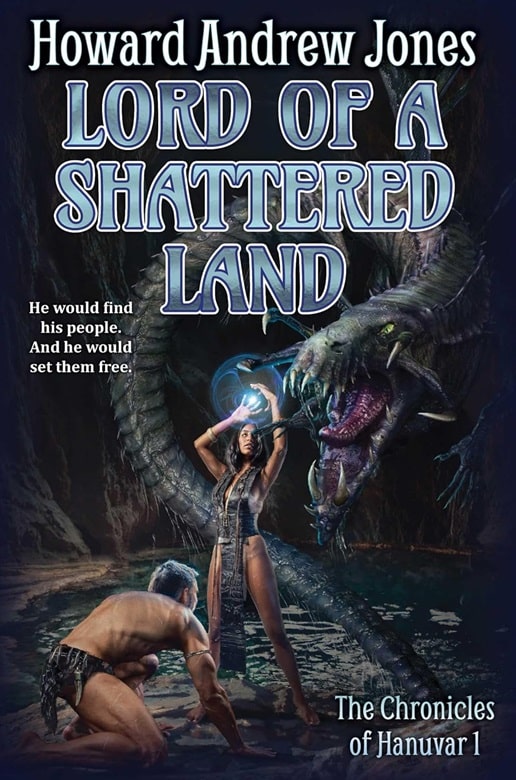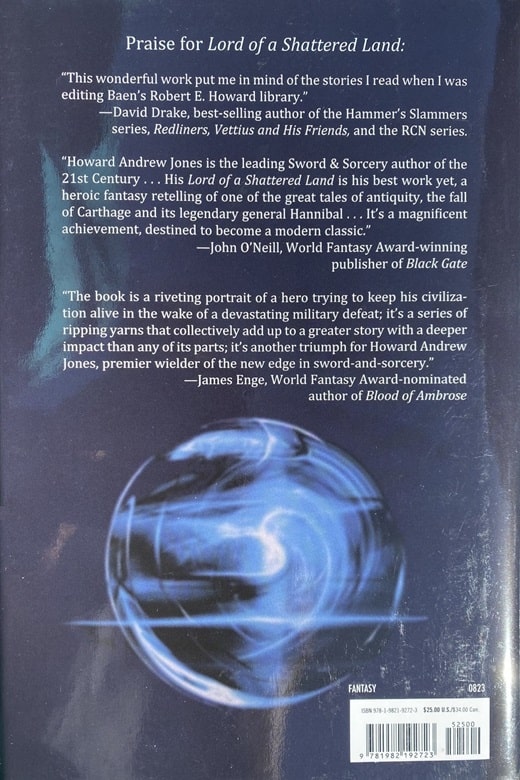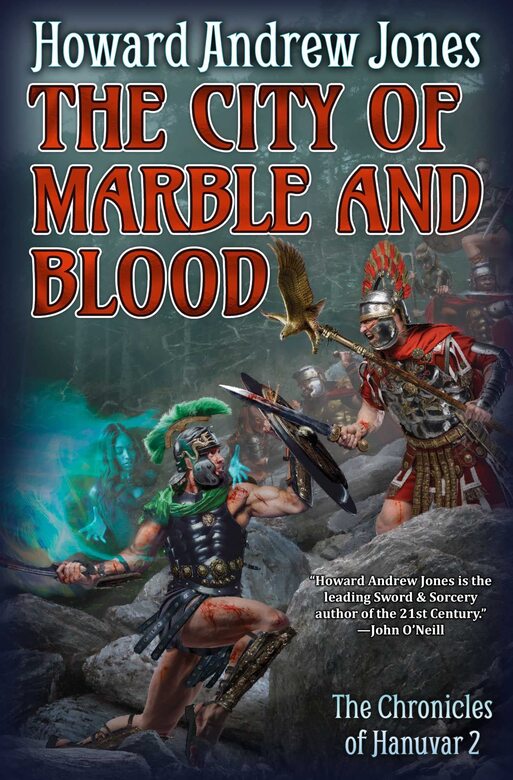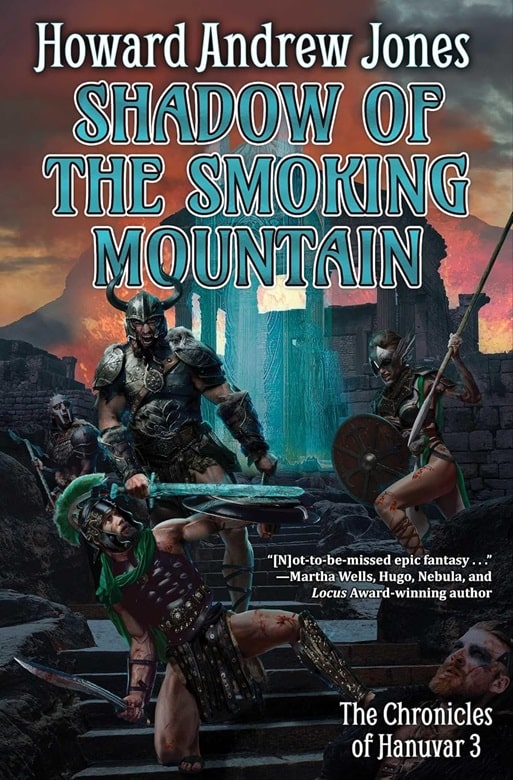Howard Andrew Jones’ Lord of a Shattered Land and the Serious Business of Swords, Sorcery, and Comedy
 |
 |
Lord of a Shattered Land (Baen Books, August 1, 2023). Cover by Dave Seeley
At about the halfway mark in Howard Andrew Jones’s Lord of a Shattered Land, the excellent opening volume of The Chronicles of Hanuvar, the author shifts gears. “Against the run of play,” he opts for comedy.
Lord of a Shattered Land is set up in episodic form, such that each of the chapters can be read independently. The first eight unfold through tightly plotted escapades that firmly position Hanuvar, the refugee general, as a heroic figure. His journeys bring him face-to-face with enemy soldiers and more than a few gruesome creatures.
As ever, the line between horror and S&S remains thin –– but that’s a discussion for another post. For today, I’m sticking with Chapter Nine, “The Autumn Horse,” in which Jones signals that he’s ready for a change of pace. To accomplish this, he has a single tool, the same one employed by every humble scrivener, and that, of course, is prose.
So how, exactly, does Jones haul Hanuvar, however briefly, into the realm of the comedic?
Let’s find out. Nuts and bolts, look out below!
[Click the images to lord over larger versions.]
 |
 |
Books 2 and 3 of The Chronicles of Hanuvar: The City of Marble and Blood and Shadow of
the Smoking Mountain (Baen, October 17, 2023 and October 1, 2024). Covers by Dave Seeley
(Fair warning: yes, from here on, I’m dropping a few spoilers to make my case. But I promise not to give away the bulk of the story or its resolution, so that both those who’ve already enjoyed Lord of a Shattered Land and those who might be reading in future can dive in safely if you so choose.)
As any parent knows, previewing is an important part of helping young children cope with the twists and turns of any given day, and so it is for writers, too. Savvy authors make sure to drop hints about how their story is to be read.
In “The Autumn Horse,” Jones starts steering the ship in the story’s second paragraph. Initially, the shift is subtle. Jones lays out how Aleria, Hanuvar’s antagonist for this particular chapter, is readying a plan that even “the most stupid of men would understand.” The statement is an invitation for readers to assume that we will shortly be meeting one or more seriously boulder-brained characters (men specifically).
Sure enough, in walks Aleria’s first henchman, Dolgrin, “huge and dim and perpetually sunburned.” The word “dim” is the key. This term, when applied to a person and not a light fixture, is a gentle, almost affectionate way of shorting any given character’s acumen. Its use is a warning bell that Jones is ready to keep things light.
To finish setting the comic place setting, Jones introduces Dolgrin’s wineskin, which reeks. When Aleria and Valentius, the gang’s second-in-command, question Dolgrin about why the skin stinks so appallingly, he explains that he found it, half-full, along the road, and so of course he had to bring it along.
But “waste not, want not,” when it comes to wineskins found lying on the road, is ludicrous policy––and we all know it. In fact, it’s so muddle-headed that the only way to greet such behavior is with slack-jawed amazement. This is something that you, yourself, would never do––which makes it inherently comedic.
And so the die is cast. Jones finishes the job by allowing Dolgrin to be entirely agreeable to throwing his nasty wine out the back door, provided he is first reassured that more and better is coming. The reader settles in, well-prepared to burrow into a story featuring a wine-happy, would-be robber who is also, at heart, affable.
Structurally, and unlike the preceding chapters, “The Autumn Horse” rests on the back of a caper––and as all experienced readers and movie-goers know, capers are inherently comic. There’s always a plan, one with many closely related steps, and that plan, in spectacular fashion, always goes wrong.
Note that Hanuvar’s own plans never descend (or ascend) to the level of a caper. His overarching goal, inherently noble, is to free his people, and that begins with trying to locate his lost daughter. He isn’t quite sure how to achieve this, and so his plans are never laid out in the exquisite, blow-by-blow detail of Aleria’s would-be heist –– and she puts her cards on the table early, further signaling that at least part of the pleasure to come will be the comic unraveling of her supposedly foolproof scheme.
In “The Autumn Horse,” Hanuvar, in disguise as a menial with a traveling circus, finds himself tasked with teaching a young lordling, Rufus, who must learn stunt riding. That Hanuvar would normally consider Rufus to be a mortal enemy is part of the joke, but where Jones really scores is that Rufus is in over his head. Better still, he’s blissfully ignorant of his limitations, and cheerful besides. From Rufus’s sunny point of view, there’s nothing he can’t do.
In a straight-faced story, Rufus’s hubris would lead to disaster.
Instead, Jones leans in to the Jeeves & Wooster aspects of this unlikely pairing. Rufus rises above at every step, drawing Hanuvar’s grudging admiration. Indeed, Rufus has no right to keep succeeding, but succeed he does, and thus he has a part to play in foiling Aleria’s horse-head heist. As Jones knows full well, when it comes to comedy, we must never underestimate the power of over-achievement.
One final example of how Jones clues readers in that in this chapter, it’s okay to crack a grin: litotes. Yes, there it is, that vocab term we were all frog-marched through back in ninth grade English. For anyone needing a refresher, litotes involves under-stating the case, or using a negative (possibly a double negative) to prove a positive. Example: I might nibble on a dessert and say, “That’s not bad,” to indicate that it’s delicious.
My favorite deployment of litotes in “The Autumn Horse” occurs when Rufus, merry as always, finds himself cornered by a man wielding a knife. Evaluating Rufus’s mind-set as he faces death, Jones writes: “Now it occurred to him he might not be riding anywhere, ever again, and it was a mite sobering.”
Uh-huh. Just a mite.
For those who come to Howard Andrew Jones for the sword & sorcery elements, never fear. “The Autumn Horse” concludes with a thrilling combat sequence, one that (SIGNIFICANT SPOILER ALERT) both Rufus and Aleria survive.
Will they return in future Hanuvar adventures? This humble scribbler certainly hopes so. We can all use a good laugh now and again.
Mark Rigney is a writer and long-time Black Gate blogger. His work on this site includes original fiction and perennially popular posts like “Youth in a Box.” His new novel, Vinyl Wonderland, dropped on June 25th, 2024. Reviewer Rich Horton said of Vinyl Wonderland, “I was brought to tears, tears I trusted. A lovely work.” His favorite review quote so far comes from Instagram: “Holy crap on a cracker, it’s so good.” A preview post can be found HERE, while his website lives over THERE.

Great thoughts, Mark, on the nature of humor and particularly Howard’s use here. For me, though, even more than the well-done writing of humor here, I think this story is quite integral to Hanuvar’s makeup and is the striking point of his major distinguishment from archetype Sword & Sorcery protagonists. His relationship arc to Rufus is simply and wonderfully marvelous.
Glad you enjoyed the read. You’re very kind. Rufus does a lot of work for Mr. Jones, no doubt. Now that I think about it, he reminds me a bit of Paddington Bear. Maybe not the brightest of bulbs, but endlessly good-hearted and willing. How others react to a character like that speaks volumes, and opens lots of possibilities for the narrative.
I haven’t read this one yet, but sometimes the on-the-margin type of story really stands out.
[…] (Black Gate): At about the halfway mark in Howard Andrew Jones’s Lord of a Shattered Land, the excellent […]